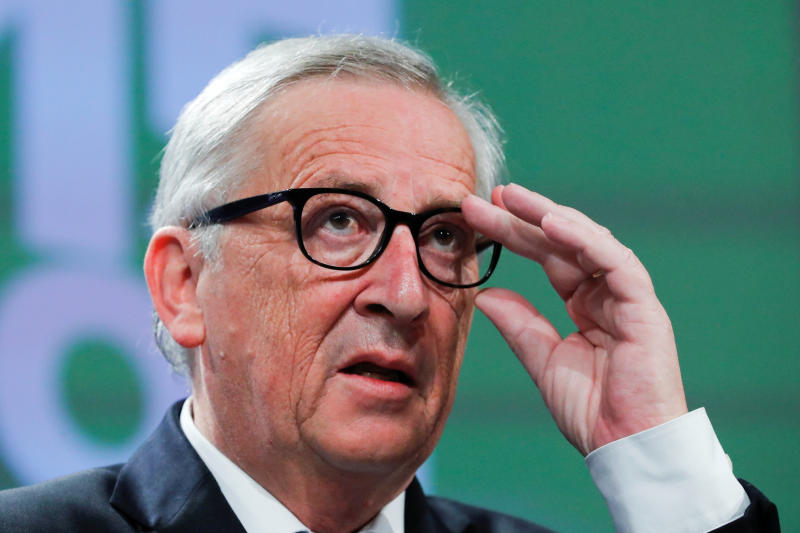News analysis
European Commission chief Jean-Claude Juncker on mission to avert trade war with US
Sign up now: Get ST's newsletters delivered to your inbox

European Commission president Jean-Claude Juncker will arrive in Washington on July 25, 2018, for trade talks.
PHOTO: REUTERS
Follow topic:
LONDON - European Commission president Jean-Claude Juncker, who arrives in Washington on Wednesday (July 25) for trade talks, fully anticipates the meetings to be some of the trickiest negotiations he ever conducted.
For the head of the European Union's executive body is not only facing a US leader determined to cut America's trade deficit with Europe, but also the first American president in more than half a century to have publicly identified the EU as a "foe" of the United States.
Total, two-way trade in goods between the EU and the US accounted for US$686 billion (S$935 billion) in 2016, the latest year for which full figures are available. Yet the two trading partners disagree on how big the trade balance in Europe's favour actually is.
Washington claims that the deficit with the EU amounted to US$147 billion in 2016, while Brussels calculates this deficit at only $125 billion. And the accounting discrepancies - explained by different ways of collecting and using statistical data - are even more pronounced if one adds to these figures the exchange of not only goods, but also services between the two trading blocs.
Either way, Mr Trump's decision, taken back in May this year, to impose additional tariffs on steel and aluminium affects bilateral trade worth only US$5 billion, so regardless of which statistics are used, this will make no major impact on America's deficit with Europe.
The EU's response has, therefore, been largely symbolic, such as slapping extra duties on denim jeans, or targeting US products that will hurt the President's electoral base in the mid-term Congressional elections in November.
Among the items now subject to higher taxes when entering the EU are bourbon whiskey from Kentucky, the home state of US Senate Republican leader Mitch McConnell, Harley Davidson motorcycles produced in Wisconsin, the home state of Republican House Speaker Paul Ryan, and orange juice from Florida, a marginal swing state where one Senate seat is up for grabs.
But all these skirmishes pale into insignificance should President Trump carry out his threat to impose tariffs as high as 25 per cent on all imported European cars and auto parts, for the EU's surplus from trading in "automotive products" with the US is a whopping US$42 billion, up to a third of all the bilateral deficit, and consists largely of German and British-made luxury cars. Averting this measure is Mr Juncker's chief task in the US.
Mr Juncker has kept silent on what offers he may be making to dissuade Mr Trump from carrying out his threat to hit Europe's car industry. One rumour making the rounds in Brussels is that he may offer to lift European tariffs on US automobiles for two to three years, thereby appearing to grant Mr Trump a quick victory. Currently, the EU imposes a 9.8 per cent tariff on passenger car imports, compared to just 2.5 percent duty charged by the US.
Diplomats are also speculating about a bigger European offer including, perhaps, the elimination of duties on trade in trucks which are charged at different rates because of a trade dispute between the EU and the US going back decades ago.
Either way, it is clear that the EU Commission is coming under pressure from both the German government and German manufacturers to avert at all costs a trade war in automotive parts.
"European Commission president Juncker and US President Trump must apply the emergency brake in the trade dispute," said Mr Dieter Kempf, who heads the Federation of German Industries, one of the country's biggest industrial umbrella organisations.
Mr Juncker may benefit from support within the Trump administration; both US Treasury Secretary Steven Mnuchin and US Trade Representative Robert Lighthizer are rumoured to be against the idea of launching a car trade war with Europe. US legislators are also fearful that the increase in retail car prices which such a war will precipitate will not sit well with voters in November.
Ultimately, everything will depend on Mr Trump's decision. Nobody knows how much time the US President will allocate to a meeting with Mr Juncker. Since the EU Commission chief does not have the status of a head of state, protocol does not require him to be received in the White House at all.
And although the EU is pressing for maximum "face time" with the President, this is not necessarily a blessing. For in many respects, the two men are quite alike. Both have short tempers, both think very highly of themselves, and both cannot resist the temptation to talk first, and think later.

